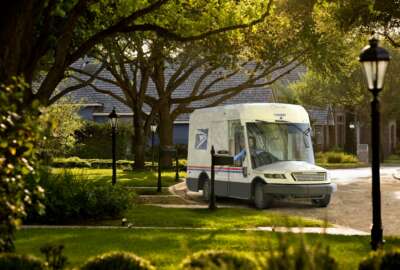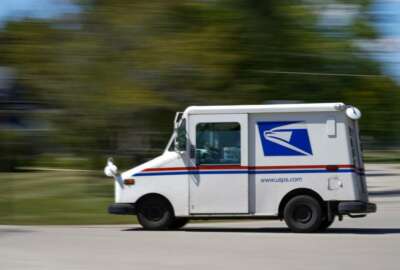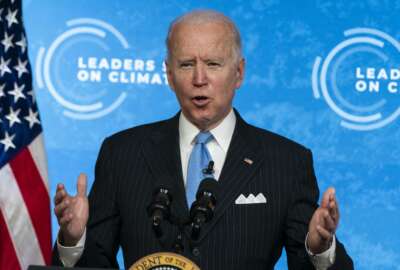USPS ‘put its thumb on the scale’ awarding delivery vehicle contract, vendor tells court
Workhorse alleged the USPS vehicle award recipient submitted a prototype vehicle “entirely different” than the one selected for production, and that the winning...
A company on the shortlist to build the Postal Service’s next-generation delivery vehicle said it was unfairly disqualified from consideration in the more than $3 billion contract.
The electric vehicle company Workhorse Group, in an unsealed complaint before the U.S. Court of Federal Claims, said it spent six years and more than $6 million designing a prototype next-gen delivery vehicle for the Postal Service.
However, Workhorse, in its bid protest over the contract award, said USPS “put its thumb on the scale against Workhorse” and took their prototype out of consideration over a “safety incident” caused by a USPS test track driver’s error.
Workhorse also alleges Oshkosh Defense, the USPS vehicle award recipient, submitted a prototype vehicle “entirely different” than the one selected for production, and that the winning design from Oshkosh “skipped the prototype phase altogether.”
“This was especially puzzling given that Oshkosh has never previously produced a last-mile delivery vehicle, much less an electric one,” Workhorse wrote in the complaint.
The vendor also claims the USPS, in its contract award, agreed to pay Oshkosh $482 million to finish developing its vehicle concept before beginning production.
The bid protest, first reported by Reuters, only adds to the scrutiny on the 10-year contract award to produce up to 165,000 delivery vehicles for USPS. Democrats in Congress have panned the contract award over a lack of consideration for electric vehicles.
Postmaster General Louis DeJoy initially told Congress that only 10% of its new fleet would be electric vehicles, but later told lawmakers that figure was “a floor – not a ceiling – based upon our current financial situation.”
President Joe Biden, setting an ambitious goal in the first month of his administration, signed an executive order directing all agencies, including the Postal Service, to move the entire federal vehicle fleet to electric and zero-emission vehicles. USPS makes up more than a third of the total federal fleet.
While DeJoy told lawmakers electric vehicles will be more expensive to purchase than those that run on fossil fuels, and will require additional spending to build charging stations, Workhorse said the Postal Service’s private-sector competitors are “aggressively moving toward all-electric, zero-emissions fleets” to save money.
“The USPS’s attempts to defend this decision on cost grounds was startling, as the reason the industry is adopting electric fleets as quickly as possible is precisely because it is now well-established that electric vehicles have a significantly lower total cost of ownership than gas-burning vehicles,” the complaint states. “As the USPS’s for-profit competitors recognize, the vast savings on fuel and maintenance dramatically outweigh the additional costs of charging infrastructure.”
DeJoy said USPS won’t place its initial vehicle order until February 2022, and would purchase more vehicles that are electric if Congress gave USPS funding to support the deal.
House lawmakers introduced a bill in March that would give USPS $6 billion in exchange for a next-generation fleet that’s at least 75% electric or zero-emission.
Despite the bill’s introduction, DeJoy told lawmakers that electric delivery vehicles would be “infeasible or impractical” for as many as 12,500 of its routes across the country.
Workhorse also states USPS took its prototype delivery truck out of consideration after it claimed a faulty parking brake system caused the vehicle to roll down an incline and into a ditch, injuring a test track driver.
“This account is demonstrably false,” the protest states.
Workhorse claims the USPS test track driver mistakenly left the vehicle in drive, instead of park, before getting out of the vehicle and walking to its cargo area.
“Instead of properly applying the brake or placing the vehicle in ‘Park’ the driver jumped out of the vehicle and it rolled down a slope and into a ditch. Rather than acknowledge the clear driver errors, the USPS not only disingenuously directed the blame at Workhorse but has seized upon this incident as its ‘posterchild’ reason it could not have awarded the contract to Workhorse,” the complaint states.
Workhorse, the only finalist to propose an all-electric fleet, said it designed its vehicle in a “highly compressed timeframe,” completing the initial design in one year and building six prototypes in 18 weeks.
USPS expects the first delivery vehicles will arrive on delivery routes by 2023, and that gas-powered vehicles manufactured by Oshkosh can be retrofitted to keep pace with advances in electric vehicle technologies.
Oshkosh Defense spokeswoman Alexandra Hittle said it is aware of the bid protest, but said the company would not comment further on the proceedings.
Hittle said the next-generation delivery vehicle (NGDV) contract with Oshkosh Defense includes both zero-emission battery electric vehicles and fuel-efficient, low-emission internal combustion engine vehicles, and that the company has “the resources and capabilities to deliver any mix the USPS orders.”
“We are proud that the USPS selected Oshkosh Defense to fulfill the needs of the NGDV program and we look forward to getting these highly capable vehicles into the hands of mail carriers,” Hittle said.
Copyright © 2025 Federal News Network. All rights reserved. This website is not intended for users located within the European Economic Area.
Jory Heckman is a reporter at Federal News Network covering U.S. Postal Service, IRS, big data and technology issues.
Follow @jheckmanWFED






